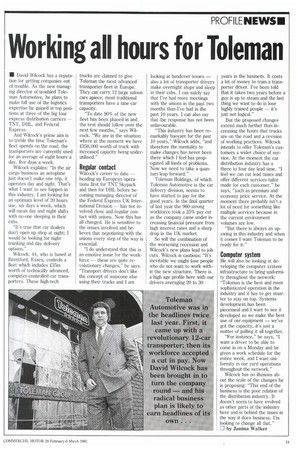Working all hours for Toleman
Page 21

If you've noticed an error in this article please click here to report it so we can fix it.
• David Wilcock has a reputation for getting companies out of trouble. As the new managing director of troubled Toleman Automotive, he plans to make full use of the logistics expertise he gained in top positions at three of the big four express distribution carriers — TNT, DHL, and Federal Express.
And Wilcock's prime aim is to treble the time Toleman's fleet spends on the road; the transporters are currently used for an average of eight hours a day, five das a week.
Wilcock explains: "In the air cargo business an aeroplane just doesn't make one trip, it operates day and night. That's what I want to see happen in this industry. I am looking for an optimum level of 20 hours use, six days a week, which will mean day and night shifts with no-one sleeping in their cabs.
"It's true that car dealers don't open up shop at night; I would be looking for night trunking and day delivery Options."
Wilcock, 44, who is based at Brentford, Essex, controls a fleet which includes £35m worth of technically advanced, computer-controlled car transporters. These high-tech trucks are claimed to give Toleman the most advanced transporter fleet in Europe. They can carry 12 large saloon cars apiece; most traditional transporters have a nine-car capacity.
"To date 90% of the new fleet has been phased in and the rest should follow over the next few months," says Wilcock. "We are in the situation where at the moment we have £250,000 worth of truck with increased capacity being underutilised."
Regular contact
Wilcock's career to date — heading up European operations first for TNT Skypack and then for DHL before becoming managing director of the Federal Express UK International Division — has not involved close and regular contact with unions. Now this has all changed. He is sensitive to the issues involved and believes that negotiating with the unions every step of the way is essential.
"I do understand that this is an emotive issue for the workforce — these are quite revolutionary changes," he says. "Transport drivers don't like the concept of someone else using their trucks and I am looking at handover issues — also a lot of transporter drivers make overnight stops and sleep in their cabs. I can safely say that I've had more meetings with the unions in the past two months than I've had in the past 10 years. I can also say that the response has not been unfavourable.
"This industry has been remarkably buoyant for the past 10 years," Wilcock adds, "and therefore the mentality to make changes has never been there which I feel has propagated all kinds of problems. Now we need to take a quantum leap forward."
Toleman Holdings, of which Toleman Automotive is the car delivery division, seems to have started to pay for the good years. In the final quarter of last year the 960-strong workforce took a 25% pay cut as the company came under increasing financial pressure from high interest rates and a sharp drop in the UK market.
So will the combination of the worsening recession and Wilcock's new plans lead to job cuts. Wilcock is cautious: "It's inevitable we might lose people who do not want to work within the new structure. There is a high age profile here with our drivers averaging 20 to 30 years in the business. It costs a lot of money to train a transporter driver. I've been told that it takes two years before a guy is up to steam and the last thing we want to do is lose highly trained people — it's just not logical."
But the proposed changes extend much further than increasing the hours that trucks are on the road and a revision of working practices. Wilcock intends to offer Toleinan's customers a wider choice of service. At the moment the car distribution industry has a three to four day lead time. "I feel we can cut lead times and offer different services tailor made for each customer," he says, "such as premium and economy price service. At the moment there probably isn't a lot of need for something like multiple services because in the current environment volumes are low.
"But there is always an upswing in this industry and when it comes I want Toleman to be ready for it."
Computer system He will also be looking at developing the computer system infrastructure to bring uniformity throughout the network: "Toleman is the best and most sophisticated operation in the industry and it has to get smarter to stay on top. Systems development has been piecemeal and I want to see it developed so we make the best use of our equipment — we've got the capacity, it's just a matter of pulling it all together.
"For instance," he says, "I want a driver to be able to come in on a Monday and be given a work schedule for the entire week, and I want uniformity in our yard operations throughout the network."
Wilcock has no illusions about the scale of the changes he is proposing: "This end of the business is the poor relation of the distribution industry. It doesn't seem to have evolved as other parts of the industry have and is behind the times in the way it does business. I'm looking to change all that." El by Janina Walker












































































